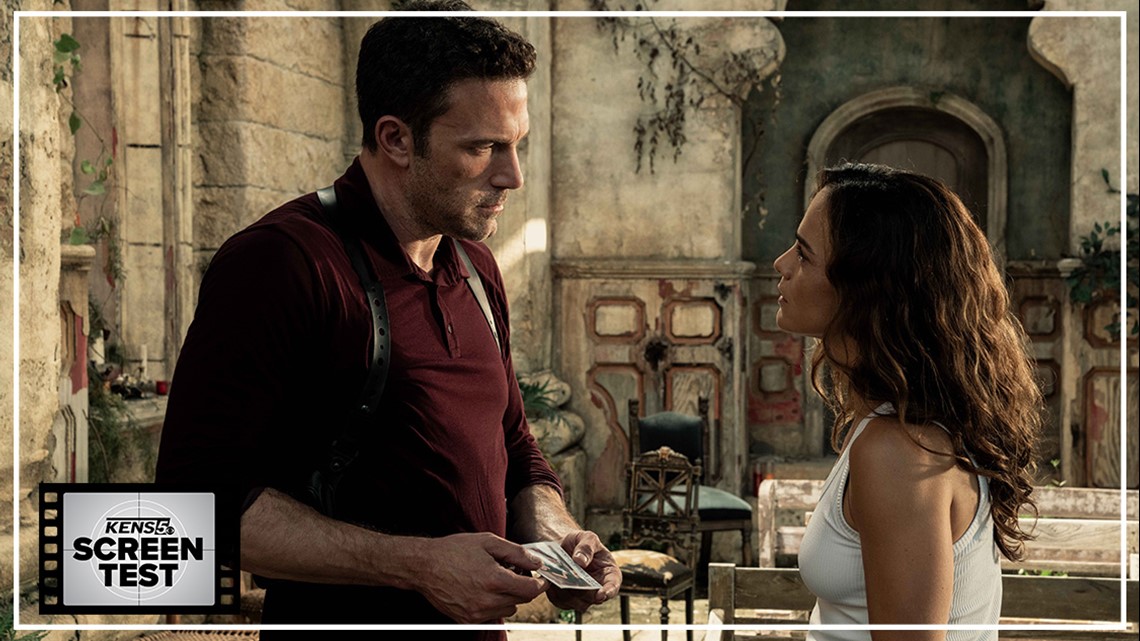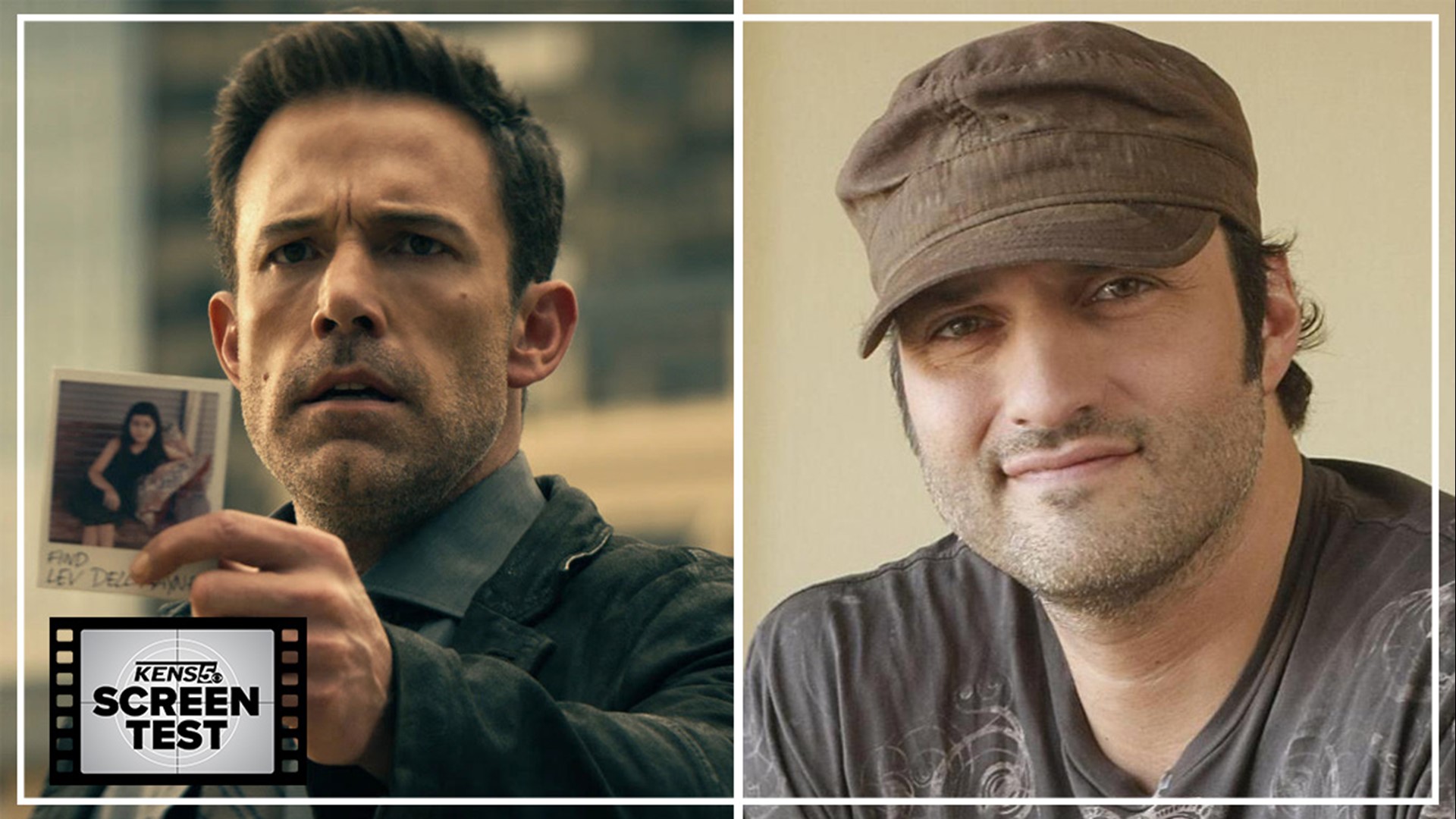SAN ANTONIO — It wasn't Robert Rodriguez's birthday when the SXSW Film and TV Festival team surprised him with a birthday cake on the Paramount stage in March, just as he was set to introduce a work-in-progress screening of his newest movie, "Hypnotic." Instead, hundreds packed into the downtown Austin theater were singing "Happy Birthday" to mark a different milestone.
February marked 30 years since the release of Rodriguez's DIY breakout "El Mariachi," a $7,000 thriller that put the San Antonio native on the map—and on the path to working with bigger stars, bigger budgets, bigger ambitions. He's long maintained his Texas roots, and in March returned to the SXSW lineup for the first time since 2019 with "Hypnotic," a scifi/action romp that stars Ben Affleck as a detective at the center of a conspiracy years after his daughter's abduction.
"Hypnotic" is far from your typical Rodriguez outing. The filmmaker with a reputation for writing, directing, editing and sometimes even scoring his own movies has long envisioned audacious stories born from simple genre twists; i.e., child spies, a bar that becomes a vampire den at night or, in the case of "El Mariachi," a musician mistaken for a hitman. "Hypnotic" instead sees Rodriguez doing his best Christopher Nolan impression; its audaciousness announces itself more loudly in the complexity of its script rather than the spectacle you see on the screen.
Ahead of the movie's May 12 release, Rodriguez spoke with KENS 5 about the legendary filmmaker who influenced him, how "Hypnotic" is about filmmaking and being involved in all stages of the creative process.
(Light spoilers follow for "Hypnotic." This interview has been edited for clarity and length.)
KENS 5: It's been 30 years since you kicked things off with "El Mariachi," and after all this time you still have a heavy hand in almost all aspects of the filmmaking process. Why has that remained important to you to be involved in such a degree with your films even as the budgets grow?
Robert Rodriguez: Man, I just love all those jobs. It was tough when I was starting out, thinking about what I wanted to do. I loved photography. I loved music. I loved drawing. I thought I could either be a cartoonist or a filmmaker; if I'm a filmmaker, I can draw the storyboards, I can photograph the movie, I can do the music. I was inspired by John Carpenter; he did the music, he wrote, he directed. With movies I could keep all my favorite hobbies in. So I started making movies, and when that took off I thought, "I don't want to give any of these jobs up." They're not normally done by one person in Hollywood. But fortunately, I made "El Mariachi" first. So when I went to make my next film for Sony, they said, "Well, you can't edit the movie too. Directors never edit their own movies." I said, "Well, you bought 'El Mariachi,' and I edited that. They went: "OK."
From then on, I was set. I could shoot my own movie, I could edit my movie. No one else was able to do that. Because of the precedent I had set with "El Mariachi," fortunately they bought it. From then on, no one ever gave me any hassle. It wasn't because I thought I was better at it or was important to me for a vision, I just liked all of those jobs and they don't happen at the same time.
Part of me directing is me having the camera in my hand and being closer to the actor, not behind a monitor. It doesn't get in the way of the directing, I think it enhances it. But the other (jobs) happen separately: You write, and then you're done writing; then you're shooting, then you're done shooting; then you're editing, you're done editing; then you're doing the music, and then you start all over again. If I just did one job I'd be pretty bored.
When I think about my experience over the years, I'm used to your films being very set piece-heavy, very audacious in the visuals. But when I caught "Hypnotic" at South By, I was surprised by how twisty the mechanics of the story are. What appealed to you about making this kind of movie where the screenplay is very layered?
Just by being such a fan of Hitchcock movies. I had done something like a Hitchcock movie originally with "El Mariachi," that was very much like one of his mistaken identity-type movies like "North By Northwest" or "The Wrong Man." When I was watching "Vertigo" in early 2000, I just thought, "Gosh, there's another one with a lot of twists, a thriller, with a star in the role. "Vertigo," "Psycho," "Spellbound," "Frenzy"—he's always good at these one word, very enticing titles. I thought, "I want to make a movie like that. I'm not sure I know how to make those movies, though." Because you can't have the dream logic like my movies normally have, like, "Oh, someone loses their leg and now they have a machine gun for leg and it works somehow."
I always just kind of fudged the rules. Can't do that in a thriller, so I knew it'd be harder to write. But because I liked the feeling of those movies so much, I thought it'd be worth it. The idea I came up with was "Hypnotic," right away the title popped in my head. I didn't want to study what hypnosis is, (so) let me go ahead and do something beyond that where you don't even know until the end of the movie how strong that ability is, because we keep morphing it and revealing new layers of it. That actually gives you a lot more freedom than a traditional thriller, because you can fudge the rules a lot.
My crew, because we kept running out of money for the movie because of all the COVID shutdowns, they worked with me a long time and they're like, "Are you sure we can get away with just the pipes and a sign that says 'Bank' and a golf cart?" I'm like, "Yeah, it'll make the hypnotics seem even stronger if that's all they have to work with!" That's not what the original idea was. But we ran out of money, and I think the lack of money and resources made it funnier and better and more entertaining.
So I didn't have to worry so much about the mechanics, but there's still some. You can't reveal too much or too little, it can't be so confusing that it's no longer entertaining. There's being confused in a good way and confused in a bad way, and the line is very fine. I didn't have enough experience to say I knew where that was. I had to kind of discover it as I went, and cross my fingers and hope that people would, all the way to the end, be with the movie and not thrown out of it.
Since you were getting out of your comfort zone a little bit, did you think about how that might adjust the expectations of your audience? At South By, you could feel the room be like, "OK, this isn't exactly your traditional Robert Rodriguez picture, but let's see where the ride takes us." How does the writing of this movie adjust your expectations for how it will be received?
I wouldn't know, but then that audience in particular in Austin, they really know my movies because I'm from here. But I think the general audience doesn't always really know who directs what. They know, "Hey, it's a Ben Affleck movie, let's go see that." So I don't think they would normally have as much expectations as you would think. Some people are aware of the filmmakers enough to go, "Oh, this is different." Others would be like, "Oh, I saw that movie 'Hypnotic' with Ben Affleck." They don't have the preconceived ideas like you or that audience did.
Sure.
But definitely you could hear that audience wondering, "When's somebody gonna blow up? When's the extra limb gonna grow out the back of his head?" (laughs) But I think the general audience wouldn't know. So that didn't bother me so much. And then, because of "Alita," it kind of helped too that I've already been doing movies that are outside of my wheelhouse. It was less of an issue than if this was between "From Dusk Till Dawn" and "Desperado" or "Sin City." (laughs) Even with "Spy Kids," it was already like, "Wow, what?" The more you keep adding variety, the easier it gets.


But yeah, it was definitely a different kind of movie. In fact, when I first came up with it I thought, "This is such a cool idea, I should just sell it. I should sell it cause somebody would probably pay good money to buy it for another director." But then I just liked it more and more. The more I thought about it, the more movies I made, the more I started realizing even what it was. It's very much like what we do as filmmakers. I always wanted to make a movie about filmmaking, because it still fascinates me to see a set and then look behind the set and see the wood back there.
I didn't want to make a movie about filmmaking because then that's too inside baseball, but this was kind of like that. Because that's what we do as storytellers and filmmakers: We create a hypnotic construct for the audience, for them to believe what they're seeing is real for long enough to laugh or cry or cheer or recommend it to their friends. And sometimes if you do a really good job, they love a character so much that it becomes more real to them than their own friends. (laughs) So the hypnotic construct, from a filmmaker's point of view, I thought it was interesting if we do that in the movie and then the middle layers start peeling back and the audience realizes they've been had.
Exactly. I don't want to spoil things too much, because there's so many left turns in "Hypnotic," but in the end things take on a different perspective; we start to see some different sets, locales. It feels very intentional. Does "Hypnotic" represent a full-circle moment for you in any way, 30 years after "El Mariachi"?
Yeah, it does. I got to use my "Alita" set, even, for this very resourcefully. Even the "Alita" set looks just like the town I made "El Mariachi" in, it's like I got that town now in my backyard. And I get to show it in this movie, it's pretty wild.
But also just the way we're making it, very shoot-from-the-hip, still being as inventive as possible to make a big movie for a smaller price. That's always been my thing since "El Mariachi," was to come up with a really big idea for a smaller budget instead of doing a small idea for a small budget. Like "Kids are spies," all you have to do is put sunglasses on them and, man, you can make that thing for $5—because the idea is so big.
Big ideas are what drive my filmmaking. I like having less money because then I get more creative freedom. I'd rather have more creative freedom on a big idea and a small budget than a big-budget movie that I'm not going to have the control and freedom to just do anything that I want.

